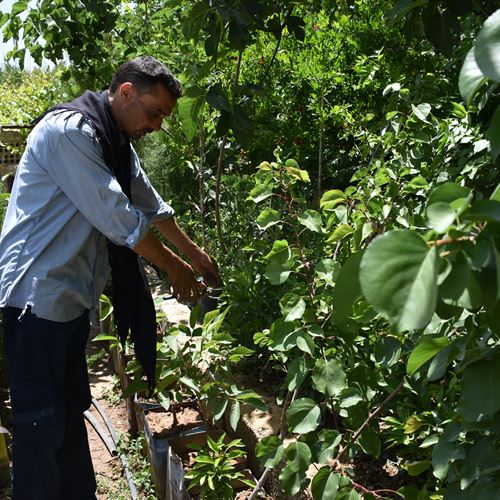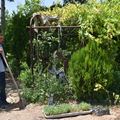News
Breathing life back into the Damascene Ghouta
Following years of conflict, the once green Ghouta became nothing like its older self. Samer took it upon himself to revive his beloved hometown.

With sheers in his hands, Samer plucked a peach off one of his many trees and tasted it. Watered with rainwater he collected throughout the winter and grown in a soil that has survived more battles than he could count or remember, Samer was proud of where he has gotten his land and his beloved Ghouta.
Previously called the green belt of Damascus, Al Ghouta was once an oasis in the middle of the desert, with greenery that you could see from miles away.
“I remember growing up here, and being surrounded by the trees, the flowers and the water wells,” said Samer.
Thirteen years of crisis has taken its toll on the once beautiful land Samer recalls from his childhood. Although the scale of devastation here was not unique in the country, the transformation was stark. Streets that used to be shaded by trees and fields are now reduced to extensive dry stretches.
“What were once streets lined with trees and lands full of crops, have turned into nothing but rubble. Miles and miles of rubble,” said Samer as he walked through his now slowly greening land, a testament to the resilience and slow recovery after years of turmoil.
With a determination to breathe life back into his tattered hometown, Samer has been slowly reviving the soil and planting different trees and crops.
“I grew up with parents who took care of this land as if it was their child. I am now taking care of it to teach my children that soil can be so forgiving; it can give you life; all you have to do is give it a little care,” he said.
“I want the next generation to grow surrounded by greenery, not the crisis's leftovers.”

What were once streets lined with trees and lands full of crops, have turned into nothing but rubble. Miles and miles of rubble.
/ Samer
To aid Samer in his recovery efforts, the Danish Refugee Council (DRC), as part of the Syrian Resilience Consortium (SRC), provided him with a grant to build a water collection pool and install solar panels. The crisis had rendered local water wells unusable, either dried up or contaminated. The new water pool is vital for irrigating his crops, which are gradually reviving.
“Having access to this water has been a game-changer. My crops are slowly coming back to life, and I am even helping farmers around the area as well,” said Samer.
Additionally, the solar panels provide a reliable electricity source, which is essential for maintaining his land. These interventions have significantly improved Samer’s ability to cultivate his land, marking a substantial shift in his recovery journey.
While Samer continues to work hard, he dreams of a day when Ghouta would become what it once used to be; “a green haven,” as Samer described it.
“Bringing Al Ghouta back would not be easy. It needs resources that we do not have access to, but I will always be hopeful of a better future,” finished Samer.
To further support the ongoing recovery efforts in East Ghouta, DRC has additionally implemented a variety of trainings and programmes in the area, showcasing a commitment to long-term support.
This includes business development services trainings, which empower local entrepreneurs with essential skills and knowledge; micro-grants have been distributed to stimulate economic growth and support small businesses and agricultural toolkits have been provided to farmers, helping to enhance agricultural practices.
Additionally, the Multi-Purpose Cash Assistance (MPCA) programme, supported by various donors, has offered crucial financial support to families and individuals, contributing to the overall resilience and recovery of the community in East Ghouta.
<
16 Mar 2024
Rebuilding Hope for Bahaa's Family in Syria
>
14 Mar 2024
After 13 years of war, Syria’s catastrophic economy is pushi…




